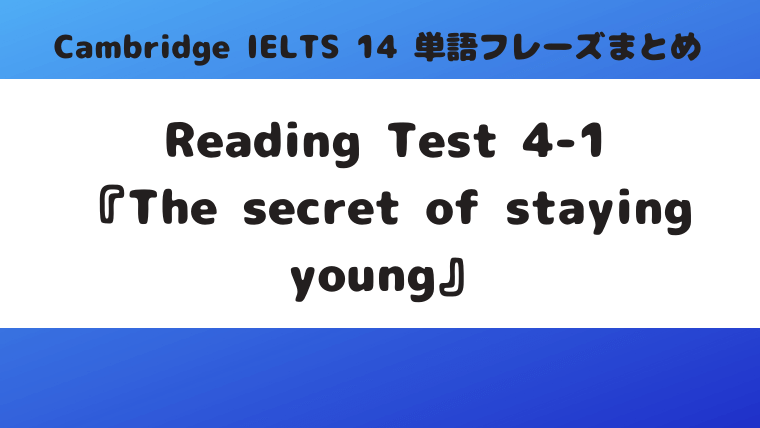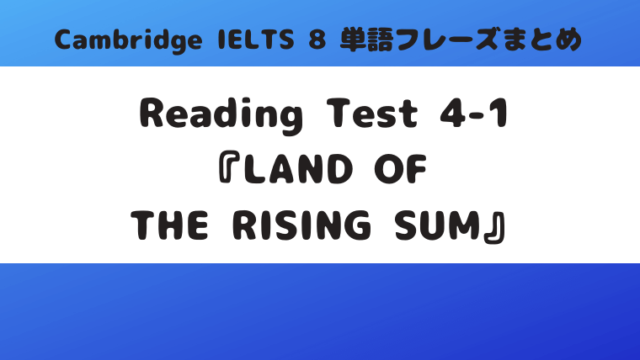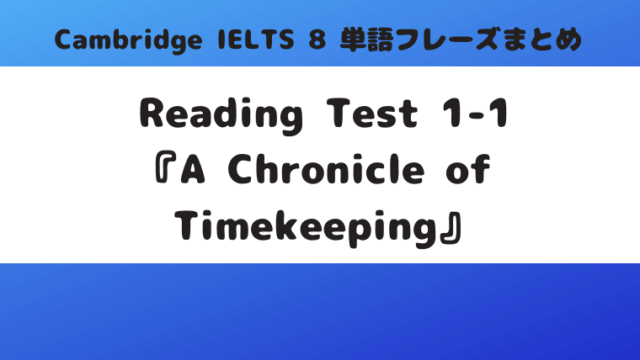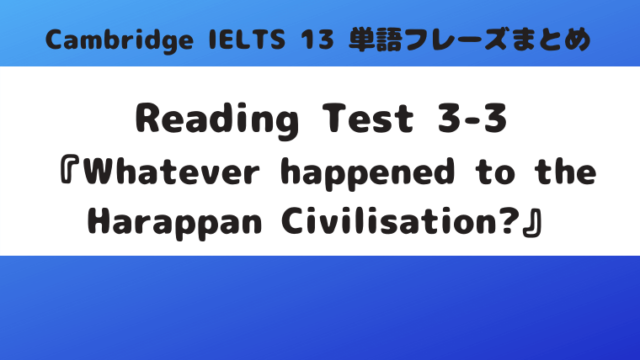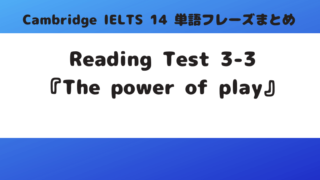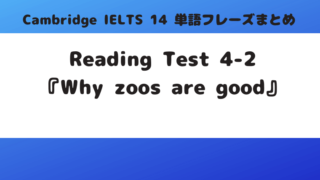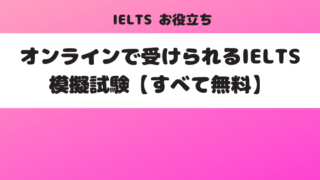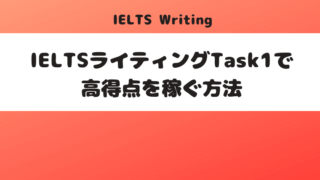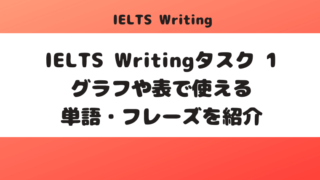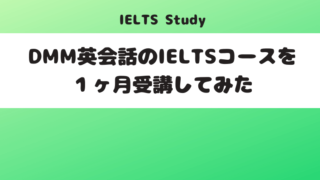「Cambridge IELTS 14」Reading Test4-1『The secret of staying young』の単語・フレーズをまとめました。
私がIELTS Readingの単語・まとめを行う理由は「Cambridge IELTS Reading単語・フレーズまとめ」からご覧ください。
Reading Test 4 Passage 1:The secret of staying young
- immortal
adjective /ɪˈmɔː.təl/
・living or lasting for ever:
・very special and famous and therefore likely to be remembered for a long time:
1 不死の
2 <名言などが> 不朽の, 不滅の - doctoral
adjective /ˈdɑk·tər·əl/
relating to the highest-ranking degree given by a university:
博士課程の - thesis
noun /ˈθiː.sɪs/
・a long piece of writing on a particular subject, especially one that is done for a higher college or university degree:
・formal the main idea, opinion, or theory of a person, group, piece of writing, or speech:
1 (学位取得のための) 論文
同意 dissertation
2 〘フォーマル〙 (議論で立証しようとする場合などの) 主張, 説 - mole
noun /məʊl/
・a small mammal that is almost blind, has dark fur, and lives in passages that it digs underground
・a small, dark spot or lump (= raised area) on a person’s skin
・a person who works for an organization or government and secretly gives information to its competitor or enemy:
・chemistry specialized a unit of measurement of the amount of a substance expressed in grams
1 ほくろ
2 モグラ
3 スパイ, 内通者
4 防波堤 同意 breakwater
5 〘専門〙 (化学で) モル, グラム分子 - deteriorate
verb /dɪˈtɪə.ri.ə.reɪt/
to become worse
《自》 悪化[劣化]する - complexity
noun /kəmˈplek.sə.ti/
the state of having many parts and being difficult to understand or find an answer to:
1 《U》 複雑さ
2 complexities 《常に複数形で》 複雑な点, 込み入った点 - worm
noun /wɜːm/
・a small animal with a long, narrow, soft body without arms, legs, or bones:
・the young of particular types of insect:
・a type of worm that lives in an animal’s intestine, feeding on the food there, or on an animal’s body, feeding off its blood:
・informal old-fashioned an unpleasant person who does not deserve respect:
1 (足がなくて細長い) 虫 ((ミミズ,ヒル,毛虫など))
→ earthworm
2 うじ虫, いも虫, 青虫 ((細長く足のない昆虫の幼虫を指す))
同意 maggot
3 ワーム ((コンピュータウイルスの一種))
4 worms 《常に複数形で》 (人間・動物の体内の) 寄生虫
5 〘インフォーマル〙 虫けら(のようなやつ) - fruit flies
キイロショウジョウバエ - pupae
pupaの複数形
noun /ˈpjuː.pə/
an insect in the stage of development after it has been a larva and before it becomes an adult, during which is is contained in and protected by a hard covering and does not move
(昆虫の) さなぎ - fed
feed の過去/過去分詞
・to give food to a person, group, or animal:
・If a baby or animal feeds, it eats or drinks milk:
・to be enough food for a group of people or animals:
・to produce or supply enough food for someone or something:
・to give a plant substances that will help it grow:
1 《他》 <人> に食べ物を与える, <動物> に餌(えさ) を与える, <赤ん坊> に授乳する
2 《他》 <家族など> を養う, <食べ物が> <ある人数> に十分足りる
3 《自》 <赤ん坊が> 乳を飲む, <動物が> 捕食する
4 《他》 <植物> に肥料を与える
5 《T always + adverb/preposition》 feed something into something
<情報・画像など>を<コンピュータ>に入力する[取り込む]
6 《他》 …に電気[燃料]を供給する, <川が> …に注ぎ込む
7 《他》 feed something in
<…>を入れる
8 《他》 <感情など> を募らせる, 増大させる
9 《他》 <必要・欲求など> を満たす, 満足させる
10 《他》 feed somebody with something
11 《他》 <選手> にパスを出す
12 《他》 <テレビ・ラジオの番組> を供給する, 配給する - telltale
adjective /ˈtel.teɪl/
allowing a secret to become known
(悪事・秘密などを) はっきり物語る, 隠しきれない - counterpart
noun /ˈkaʊn.tə.pɑːt/
・a person or thing that has the same purpose as another one in a different place or organization:
somebody’s / something’s counterpart
<…>の対応相手[対応物] - mandible
noun /ˈmæn.dɪ.bəl/
・in a person or animal, the lower jaw bone
・in insects, one of the two parts of the mouth used for biting and cutting food
1 あごの骨, 下顎(かがく) 骨
2 くちばし
3 (昆虫の) 大あご - density
noun /ˈden.sɪ.ti/
・(also denseness) the number of people or things in a place when compared with the size of the place:
・physics specialized the relationship between the mass of a substance and its size
1 込み具合, 密集度
2 (物の) 密度 - neurons
noun /ˈnjʊə.rɒn/
a nerve cell that carries information between the brain and other parts of the body
ニューロン, 神経単位 同意 nerve cell - serotonin
noun /ˌse.rəˈtəʊ.nɪn/
a neurotransmitter (= a chemical in the body that carries messages from the brain) that helps you feel relaxed and happy
セロトニン ((神経伝達物質の一つ)) - dopamine
noun /ˈdəʊ.pə.miːn/
a hormone (= chemical substance) that is made naturally in the body and may also be given as a drug
ドーパミン ((筋肉を正常に機能させるための脳内化学物質)) - coincide
verb /ˌkəʊ.ɪnˈsaɪd/
・to happen at or near the same time:
・to be the same or similar:
1 同時に起こる, 時期が重なる
2 《進行形不可》 <考え・意見が> ぴったり合う, 一致する
3 <道などが> 合流する, <場所などが> 一致する - senescence
noun /sɪˈnes.əns/
the fact of becoming older, and therefore being in less good condition and less able to function well:
<人が> 初老の, <物が> 老朽化が進んだ - deteriorate
verb /dɪˈtɪə.ri.ə.reɪt/
to become worse
《自》 悪化[劣化]する - predators
noun /ˈpred.ə.tər/
・an animal that hunts, kills, and eats other animals:
・disapproving someone who follows people in order to harm them or commit a crime against them
1 捕食動物, 天敵
→ prey
2 〘けなして〙 (金銭的・性的に) 人を食いものにするやつ
3 (他社の) 買収[乗っ取り]をもくろむ企業 - entomologist
noun /ˌen.təˈmɒl.ə.dʒi/
the scientific study of insects
昆虫学 - broader
adjective /brɔːd/
・very wide:
・If something is a particular distance broad, it measures this distance from side to side:
1 <道などが> 幅の広い
反意 narrow → breadth, wide
2 <肩・背中などが> 幅広の, 大きな
反意 narrow
3 <範囲・分野などが> 広い, 広範囲な
反意 narrow
→ breadth
4 大まかな, 大筋の
5 <笑みが> 満面の
6 <土地・海などが> 広々とした, 広大な
7 <なまりが> きつい, 強い
8 明白な, わかりきった
9 <冗談などが> 露骨な
